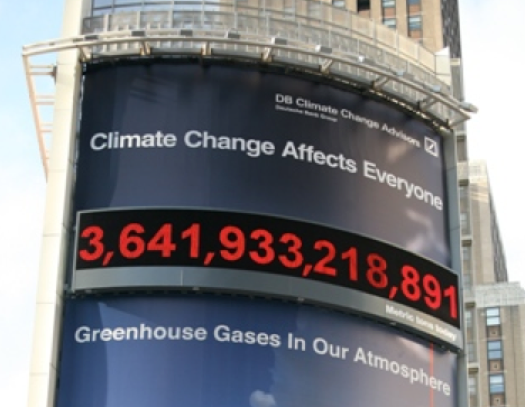Copenhagen Synthesis Report
In March the biggest climate conference of the year took place in Copenhagen: 2500 participants from 80 countries, 1400 scientific presentations. Last week, the Synthesis Report of the Copenhagen Congress was handed over to the Danish Prime Minister Rasmussen in Brussels. Denmark will host the decisive round of negotiations on the new climate protection agreement this coming December.
The climate congress was organised by a “star alliance” of research universities: Copenhagen, Yale, Berkeley, Oxford, Cambridge, Tokyo, Beijing – to name a few. The Synthesis Report is the most important update of climate science since the 2007 IPCC report. [ … ]
From a natural science perspective, nothing stops us from limiting warming to 2ºC. Even from an economic and technological point of view this is entirely feasible, as the report clearly shows. The ball is squarely in the field of politics, where in December in Copenhagen the crucial decisions must be taken. The synthesis report puts it like this: Inaction is inexcusable.’
Read the full blog posting with links to other material at RealClimate.
New York’s Carbon Counter
New Yorkers leaving Penn station and the tenor Andrea Bocelli’s concert at Madison Square Garden stadium were confronted with an unusual advert yesterday – a huge sign showing greenhouse gas levels in the atmosphere.
Updated in real time, using projections from monthly measurements of CO2 and other greenhouse gases by Massachusetts Institute of Technology, the Carbon Counter is designed to get everyone to reduce their emissions.
Kevin Parker, the global head of Deutsche Bank’s asset management division, which put up the 21-metre sign, said: “Carbon in the atmosphere has reached an 800,000-year high. We can’t see greenhouse gases, so it is easy to forget that they are accumulating rapidly.”
Yesterday the counter, which uses 40,960 low-energy LEDs and carbon-offsets its electricity usage, gave a figure of 3.64tn tonnes.
Senator Christine Milne: the Climate Nightmare is upon us
This may go down as a landmark speech on the state of our planet. Not just on climate change but the bigger picture too.
Being given today at the National Press Club: http://www.crikey.com.au/2009/06/17/milne-the-climate-nightmare-is-upon-us/
Senator Christine Milne – Press Club Address June 2009 from Christine Milne on Vimeo.
Significant new report on climate impacts in the US
Opening salvo in the Obama adminstration’s attempts to steer a new course on climate change in said country? He’s in the ship’s control room, now he has to wrestle to get his hands on the helm.
Climate Change Impacts in the United States
How to shut 93% of coal without building new plants
In the USA, more MW are generated by gas than coal power stations. (MWh is another story.) As Sean Casten’s story from Grist asks, ‘When it runs, the natural gas fleet emits just 50% of the CO2 of the coal fleet, which raises a rather interesting question: what would we have to do to make it run harder? And how big a difference would that make in our national CO2 footprint?’ Wonder what the gas vs coal breakdown is in Australia.
Green roofs compulsory in Toronto
‘Roofs make up 21% of the area of Toronto, so it is logical that they should be put to good use. Now they will be green; by a stunning 36-2 vote, council approved new rules that require green roofs on residential buildings next year and on industrial buildings in two years. Like most good legislation, people at both ends don’t like it; Steven Peck of Green Roofs for Healthy Cities says in the Globe and Mail that “We would have liked it [the Toronto bylaw] to be more aggressive,” while the real estate industry lobby group says Cost is an issue,The market is so price-sensitive now.” ‘ Read the rest of this post from Treehugger. Listening, Mr Doyle?
Climate change and biodiversity
Animals have been used as bio-indicators since canaries were taken down into coalmines (and probably long before that.) Now there is increased concern about the impact on animal and plant species of climate change, there are numerous projects and studies focused on biodiversity.
- A virtual book of all life on Earth is being created by UK and US scientists.
The online reference work will create a detailed world map of flora and fauna and track changes in biodiversity … Over time the database will log shifts in species and other data such as changes in the density of forests and when plants first flower. The backers of the idea hope that the vast, virtual book of life will eventually be comparable to the global system used to watch for and record earthquakes. - More dolphins, porpoises and whales could be at risk from the effects of climate change than was previously thought, a new study has claimed.
An Aberdeen University scientist said rising sea temperatures could affect 88% of areas where cetaceans are found. Dr Colin MacLeod said areas of suitable habitat for many were likely to shrink, meaning fewer animals.
And he warned a decline in habitat could be so dramatic that it could increase the extinction risk for some. - A bumblebee which is extinct in the UK is to be reintroduced from New Zealand under plans being announced. The short-haired bumblebee was exported from the UK to New Zealand on the first refrigerated lamb boats in the late 19th Century to pollinate clover crops. It was last seen in the UK in 1988, but populations on the other side of the world have survived.
All these stories from the BBC Science and Environment web page (RSS feed).

